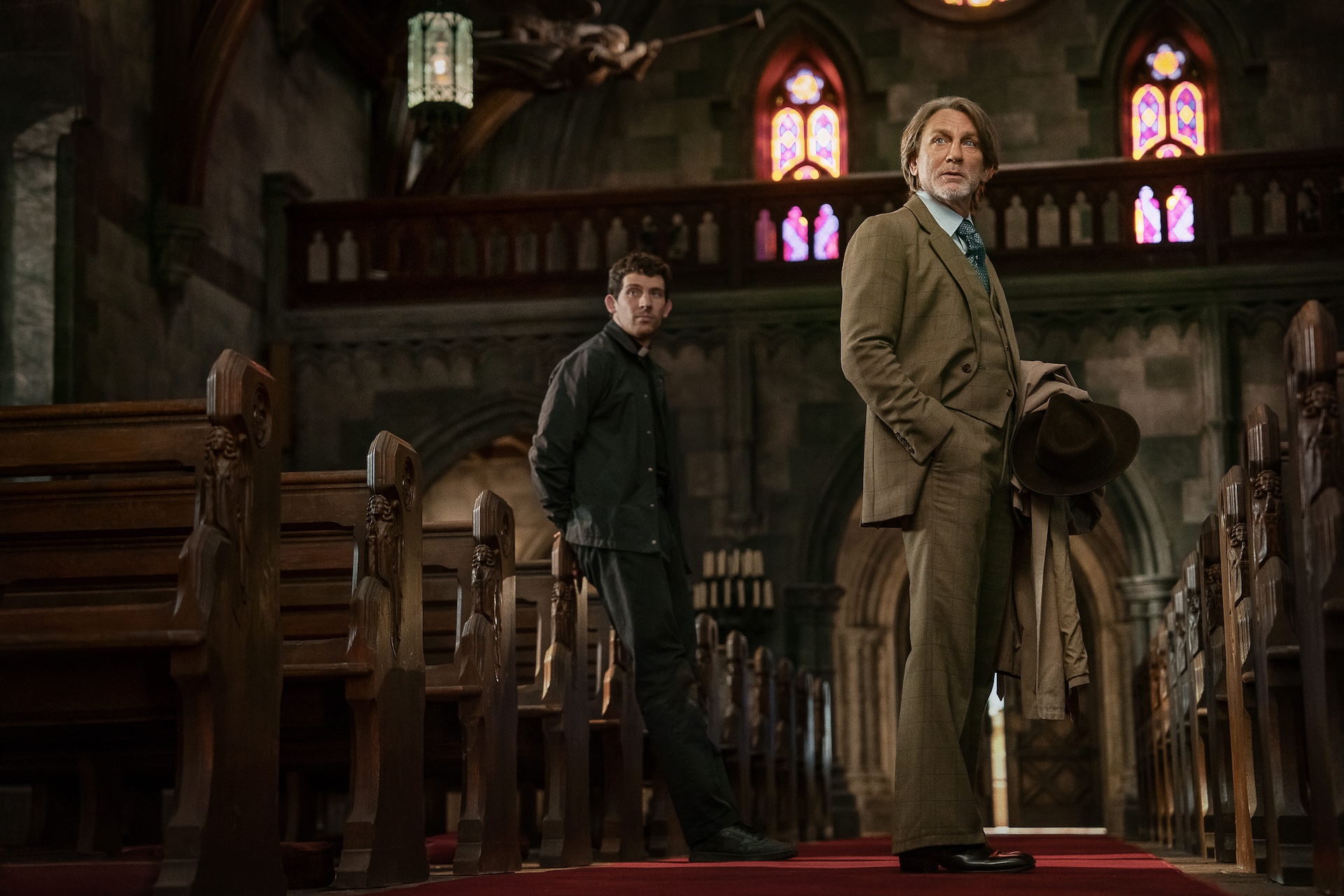Words like “bold” and “daring” and “wild” will be thrown around — really, have already been thrown around — in regards to Nia DaCosta’s “Hedda,” one of the more original and thrilling adaptations of a classic work in recent memory. The same words apply to the title character at the film‘s center, the inscrutable and seemingly unscrupulous Hedda Gabler (a magnetic Tessa Thompson), here yanked firmly from the late 20th century setting of Henrik Ibsen’s iconic play into the ’50s, and not missing a single trick along the way.
The time setting is hardly the only thing DaCosta, who also wrote the film’s screenplay has changed here, which now imagines Hedda to be a Black woman (one supporting character marvels at her “dusky” skin) whose love affairs involve both men and women. The former flame who shows up at her sprawling (read: unaffordable) country home for a raucous (read: deadly) party is, in DaCosta’s telling, now a woman: Eileen Lovborg, no longer Eilert Lovborg. Again, bold and daring and wild changes, sure, but also imaginative and illuminating. Which is to say: this all works, very well.
The film opens the morning after Hedda’s party, thrown to celebrate Hedda and her husband George Tesman’s (Tom Bateman) entrance into society. What the party is really thrown for is something far less mundane: In seeking to please Hedda, struggling professor George has purchased the pair a lush, lavish country estate they can absolutely not afford (production designer Cara Brower’s work is stunning, and makes it easy to see why anyone would go half-mad to live here). They’ve been assisted by Hedda’s long-time family friend Judge Roland Brack (Nicholas Pinnock), who takes every opportunity to try to ravish a disgusted Hedda, clearly believing he’s owed something.
But George has hopes that the Tesmans might soon not owe anyone anything, as they’ve invited university muckity-muck Professor Greenwood (Finbar Lynch) to the party, and they hope to impress him so very much that he’ll give George a cushy new job (and, you know, money). And this party is going to be grand indeed, molded to Hedda’s particular taste as possible — less flowers, more champagne — and kitted out with a guest list that proves more bizarre as the night winds on. For Hedda, a woman defined by the many constraints that hold her (familial, professional, societal, racial, sexual, the list goes on and on), a party is something she can really control and make her own.
More to the point: a party’s guests are something she can really control and make her own. While the constantly cowed George thinks this is all for him, Hedda has other ideas. Also on their way to the mansion: Eileen Lovborg, Hedda’s former flame, George’s current rival for that new gig, and apparently some sort of changed person. When Hedda and Eileen were wild together, Eileen’s drinking and carousing was a problem, but she’s put all that wickedness behind her, mostly thanks to the love of Thea Clifton (a delicate Imogen Poots), who has also just arrived at the mansion for the world’s worst party.
Thea, of all people, sees Hedda most clearly: as the women reacquaint themselves before Eileen’s promised arrival, she muses that Hedda was “terrifying” when they first knew each other in school. That has not abated, but Hedda’s reign of terror will find new ways to out itself (and her) over the course of one devastating party. Upstairs, in one of the mansion’s many jewel box rooms, Hedda displays her most prized collection: a set of guns handed down to her by her later father General Gabler, which she toys with, tosses around, and loans out, all depending on her whims. In the bottom of the guns’ shiny box, there’s a shallow reserve, just big enough to hide… well, you’ll see.
Since Ibsen first introduced Hedda in 1891, she’s served as one of the theater’s great anti-heroines. What she refers to as her “whimsicality” is something far richer (or wilder, bolder, take your pick): in being so repressed and restrained, it’s only a matter of time that someone as singular as Hedda is going to combust. That she opts to do that at a party? Well, that’s just sort of fun. Until it very much is not. Unable to control nearly everything about her life, despite making nothing but safe choices (“safe choices,” thy name is George Tesman), Hedda cannot hold. Conventionality does not offer the protection she expected it to, and so the pain is doubled: she didn’t do want she wanted, and she still has nothing to show for it.
When Eileen finally swoops into the party (the great Nina Hoss is so electric in her entrance, it’s nearly the only moment we’re distracted from Thompson, who is riveting in every moment), all bets are suddenly off. Hedda, so determined to be mistress of her own emotions, is felled. This is the great love of her life, and she arrives reborn, in love with someone else, with her next great book literally tucked under her arm, and free of the influence of booze and bad decisions. Hedda, of course, takes this all as a challenge.
Thorny, pissed-off, and hellbent on shaping anything she can to her liking, Hedda stalks around the party, needles here, pushes there, and joyfully takes stock at where her machinations are getting her. Thea falls apart. Eileen falls headfirst into a cocktail. Hedda’s rage is so potent that it impacts others seemingly out of her purview, and as the party pushes far into the night, the only question isn’t what will happen next, but how horrific it will be.
And yet. Hedda’s magnetism is undeniable, and that people would be under her thrall is understandable. DaCosta and a talented team of craftspeople bolster that idea at every turn: Sean Bobbitt’s cinematography is lush and oversaturated, Hildur Guðnadóttir’s unpredictable score fuels the party atmosphere with a tinge of dread, and Lindsay Pugh’s costumes are sumptuous. There is always something to look at or touch or hear in the mansion, enough that it can almost distract from the evils Hedda is perpetrating, against both herself and others.
At one point, a guest who doesn’t know Hedda tells her he’s heard of her past, that before she was domesticated, she was “like fire.” That flame is still burning in “Hedda” (and in Hedda), but that brightness masks its true nature: destruction. But, oh, what fun to stand back and let it shine, at least for one evening.
Grade: B+
“Hedda” premiered at the 2025 Toronto International Film Festival. Amazon MGM will release the film in select theaters on Wednesday, October 22 and then globally on Prime Video on Wednesday, October 29.
Want to stay up to date on IndieWire’s film reviews and critical thoughts? Subscribe here to our newly launched newsletter, In Review by David Ehrlich, in which our Chief Film Critic and Head Reviews Editor rounds up the best new reviews and streaming picks along with some exclusive musings — all only available to subscribers.



